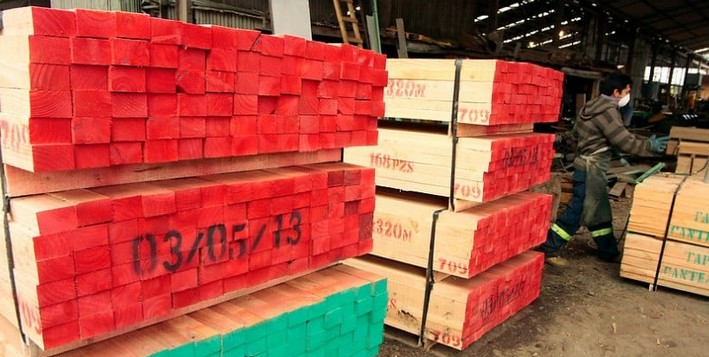- Corma and local lawmakers analyzed the industry's reality. Strengthening security and creating a promotion policy would be key to reviving timber industry growth.
The forestry sector accounts for 26% of Ñuble's regional GDP, yet it is currently in crisis. In Chile, 200 sawmills have closed in the last 7 years, 50 of which are in Biobío. In Ñuble, there are 89 sawmills, with 31 currently inactive.
The Chilean Wood Corporation (Corma) noted that globally, the forestry sector is the most supported as a powerful tool to combat the ongoing climate crisis. However, in Chile, the situation is the opposite, with a constantly declining industry losing 3,200 jobs annually and 35,000 hectares of forests disappearing.
Corma views this scenario with concern and recently held a meeting with lawmakers to find solutions to this critical situation. Alejandro Casagrande, President of Corma Biobío-Ñuble, explained that two key factors have visibly harmed the national timber industry.
"One is security, which we consider essential to address. If we can't resolve this, we won't solve growth issues. With 5,000 to 6,000 forest fires annually amid high temperatures, there's no way forward. The second necessity is reviving the old national policy promoting forest plantations," said the industry leader, adding that unplanted hectares particularly harm small and medium landowners.
Boosting the Industry
Local lawmakers acknowledged the urgency of finding solid solutions to the forestry crisis. Deputy Sara Concha emphasized that, at a time when job creation is critical, the timber industry's crisis demands immediate action.
"The forestry sector is vital to the country's economic development. As lawmakers, we must take steps to restore its course. Clearly, the security crisis is harming productivity and employment in forestry, so we need a strategy to strengthen and recover the sector," she stated.
Deputy Frank Sauerbaum pointed out that wildfires have severely impacted regional forests, burning around 45,000 hectares, including 12,000 belonging to small landowners.
"We need a policy to promote forestry, and we will push for it in next year's budget law. We'll collaborate with other central-south lawmakers to demand government action, at least for burned forest recovery," he explained.
The Ñuble legislator added that the government "dislikes monoculture plantation policies. I understand their ideological bias, but we want to revive an industry that has generated not only wealth but also well-being and jobs for thousands. Forestry isn't just about timber and pulp—it includes transport, biomass energy, and fiber production for clothing."
Sauerbaum criticized the government's proposal, calling it overly conditional by requiring native tree planting in water-scarce areas. "The government's plan shows complete ignorance of regional realities."
Source: subscription edition ofcronicachillan.cl







Comentarios (0)
No hay comentarios aún. ¡Sé el primero en comentar!
Deja un comentario